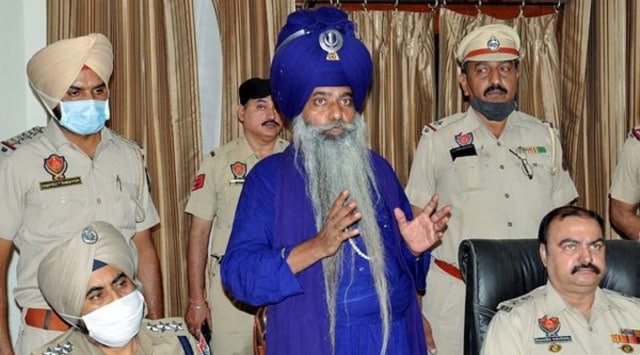Lakhbir Singh cremated — kin present, most villagers not
There was a controversy over the cremation, as local residents had earlier declined to give space for Singh's cremation in the village. However, they agreed later on the condition that there will be no religious ritual during the cremation.
 Police personnel with accused Nihang Singh for his alleged involvement in the murder of Lakhbir Singh, who was killed at a farmers' agitation site in Delhi, during a media briefing in Amritsar, Saturday, Oct. 16, 2021. (PTI Photo)
Police personnel with accused Nihang Singh for his alleged involvement in the murder of Lakhbir Singh, who was killed at a farmers' agitation site in Delhi, during a media briefing in Amritsar, Saturday, Oct. 16, 2021. (PTI Photo)Lakhbir Singh, the Dalit Sikh killed allegedly by Nihangs at Delhi’s Singhu border on Friday, was cremated at his native village Cheema Khurd in Punjab’s Tarn Taran district on Saturday evening in the presence of family members even as most villagers and relatives stayed away.
Police security was provided to avoid any untoward incident at the time of cremation.
There was a controversy over the cremation, as local residents had earlier declined to give space for Singh’s cremation in the village. However, they agreed later on the condition that there will be no religious ritual during the cremation.
Sarpanch Awan Kumar said, “Earlier, villagers were opposed to Lakhbir Singh’s cremation (in the village), as he had brought bad name to the village. He caused pain to his family and children when he was alive, and shamed the whole village with his act before his death. Later, we had left it to his sister to decide whether to bring the body back (to the village). The village had decided to boycott the cremation due to Singh’s involvement in the sacrilege case.”
Some Sikh organisations had also opposed Lakhbir Singh’s cremation.
Sources said the Punjab government and the local administration swung into action and convinced the villagers and Sikh organisations to soften their stand. “It was decided that villagers will not attend (the cremation), and there would be no religious cremation,” the village sarpanch said.
“It is painful that no last prayer was read during the cremation. Some Nihangs and villagers objected to the last prayer (being read),” Lakhbir’s brother-in-law Sukhchain Singh said. “Even if Lakhbir had committed a mistake, even then the last prayer should have been allowed. We demand action against the persons involved in his murder. There should be a proper investigation into why Lakhbir was killed in this manner. The truth should come out.”
According to Sikh rituals, a priest is to remain present during cremation and read the Kirtan Sohla from the Guru Granth Sahib and read the prayers. The Guru Granth Sahib is then installed at the home of the deceased for its full recitation in three, seven or 10 days, according to wishes of the family concerned.
All the rituals related to the dead is to conclude with the bhog and last prayers on the last day of recitation of the Guru Granth Sahib, as per rituals.
Post-cremation, Lakhbir’s wife and children returned to her maternal home. Most other family members and close relatives stayed at the home of the deceased until the end of all rituals on Saturday evening.
“Lakhbir Singh lived a low-profile life in his village. But his murder made him a household name in a tragic way. No one should meet such an end… it doesn’t matter how the person lived,” a villager who did not want to be named said.
“It is still a mystery for us: how and why did Lakhbir Singh go to Delhi? Who took him to Delhi? Why did he join the Nihangs there? Nobody is answering these questions,” Sukhchain Singh said.
Cremation ‘not allowed’, chief of Scheduled Castes panel speaks to Punjab DGP
Vijay Sampla, Chairperson of the National Commission for Scheduled Castes, on Saturday spoke to the Punjab DGP, seeking strict action against villagers for “not allowing” the cremation of the body of the Dalit farm worker who was found dead at the Singhu border on Friday.
“This is against the Scheduled Caste and Scheduled Tribe (Prevention of Atrocities) Act, 1989. The villagers are not allowing the last rites of the deceased. I have spoken to the DGP and asked him to take cognisance of the matter and take strict action against the perpetrators,” he told The Sunday Express.
The victim, from Tarn Taran district, was allegedly targeted by a group of Nihang Sikhs for allegedly desecrating the Guru Granth Sahib.
“I have heard stories about the kind of atrocities that would be carried out by the Taliban and the ISI, but these kinds of things would not happen in our country. They do now. It is heartbreaking,” Sampla said.
On Friday, Sampla had issued a notice to the Haryana DGP and Chief Secretary, asking them to furnish a report on the Singhu border incident. On Saturday, he met a few Dalit organisations in Delhi which raised the issue with the Commission.
“SKM and the farm leaders are distancing themselves from the incident, but they cannot absolve themselves of the responsibility…The accused have been a part of the farm protests, sitting with them for the past 11 months, and were very much a part of their organisations. The site where the incident took place is near the stage where the protests were happening,’ Sampla said. (ENS)







